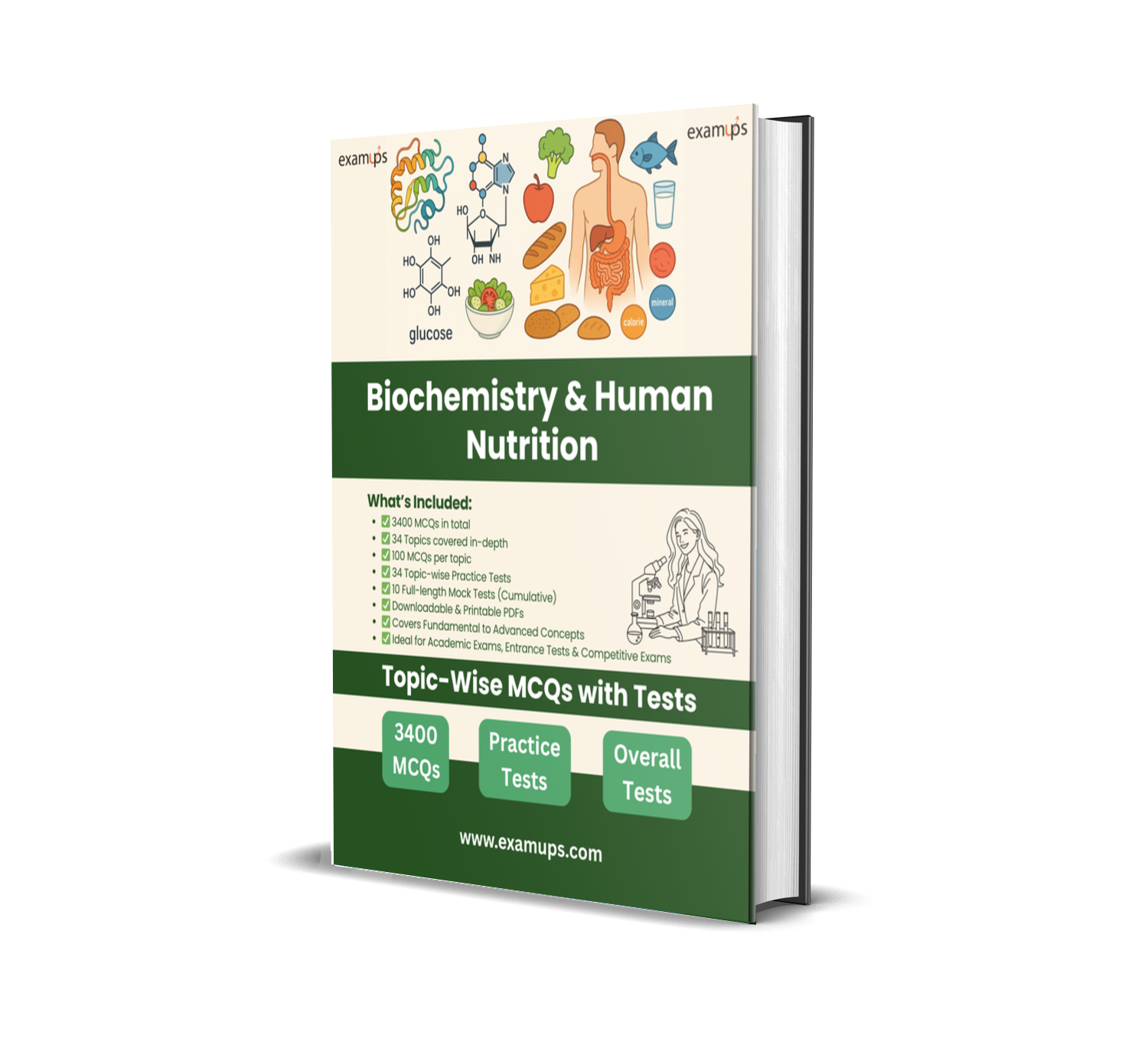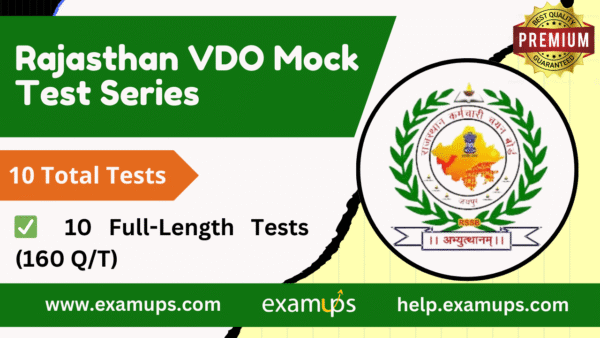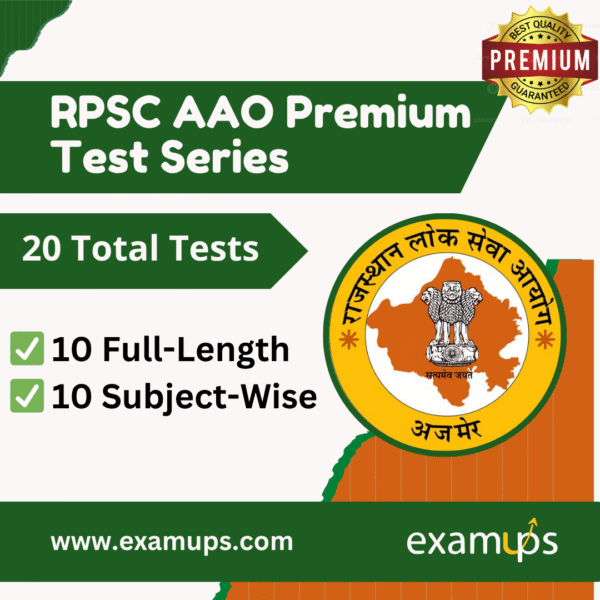Description
Biochemistry & Human Nutrition: Topic-Wise MCQ Practice Test Series (3400+ MCQs, 34 Topics, 10 Mock Tests)
The Biochemistry & Human Nutrition MCQ Practice Test Series is a comprehensive and structured collection of 3400 multiple-choice questions organized meticulously across 34 key topics. This series is designed for students, aspirants of competitive exams, and professionals who wish to master the fundamentals and applications of Biochemistry and Human Nutrition. Each topic includes a dedicated practice test containing 100 MCQs, ensuring deep coverage and systematic preparation. Additionally, 10 full-length mock tests simulate real exam conditions and test cumulative knowledge across all topics.
All tests are provided in downloadable PDF format, allowing learners the flexibility to study offline and assess their understanding at their own pace.
What’s Included:
- ✅ 3400 MCQs in total
- ✅ 34 Topics covered in-depth
- ✅ 100 MCQs per topic
- ✅ 34 Topic-wise Practice Tests
- ✅ 10 Full-length Mock Tests (Cumulative)
- ✅ Downloadable & Printable PDFs
- ✅ Covers Fundamental to Advanced Concepts
- ✅ Ideal for Academic Exams, Entrance Tests & Competitive Exams
Topic-Wise Coverage
The entire syllabus is divided into four core modules, each containing carefully crafted lessons:
Module 1: Bio-Molecules
- Amino Acids
Focus on structure, classification, properties, and functions of amino acids. - Protein Structure
Covers primary to quaternary structure, bonds involved, and protein folding. - Carbohydrates
Includes monosaccharides, oligosaccharides, polysaccharides, and their biological roles. - Lipids
Understanding of fatty acids, triglycerides, phospholipids, and their metabolic importance. - Nucleic Acids (DNA & RNA)
Structure and function of DNA/RNA, base pairing, replication, transcription, and translation. - Spectrophotometric Assays of Bio-Molecules
Covers principles of spectrophotometry, applications in quantifying biomolecules.
Module 2: Enzymes
- Enzyme Catalysis and Classification
Mechanism of enzyme action and the six classes of enzymes. - Enzyme Kinetics
Michaelis-Menten equation, Lineweaver-Burk plot, Km and Vmax. - Mechanism of Enzyme Action
Focus on active sites, substrate binding, and transition state theory. - Factors Affecting Enzyme Activity
Influence of pH, temperature, substrate concentration, and inhibitors. - Enzyme Inhibition
Competitive, non-competitive, uncompetitive inhibition with graphical representation. - Regulatory Enzymes
Role of allosteric enzymes, feedback inhibition, and covalent modification. - Immobilization of Enzyme
Techniques, advantages, and applications in industry and diagnostics. - Zymogens and Ribozymes
Inactive enzyme precursors and RNA-based catalysis. - Determination of Enzyme Activity
Methods used to quantify enzyme units, turnover number, and catalytic efficiency.
Module 3: Metabolism
- Glycolysis
Detailed step-by-step breakdown of glucose to pyruvate and its regulation. - Gluconeogenesis
Pathway reversing glycolysis and its physiological importance. - TCA Cycle (Citric Acid Cycle)
Steps, enzymes involved, energy yield, and anaplerotic functions. - Glycogen Degradation and Synthesis
Role of glycogen phosphorylase and synthase; hormonal control. - Fatty Acid Oxidation
β-oxidation pathway, ATP yield, and regulation. - Biosynthesis of Fatty Acids
Steps involved in lipogenesis and regulation by insulin and glucagon. - Electron Transport Chain and ATP Synthesis
Mitochondrial oxidative phosphorylation, chemiosmotic theory, and inhibitors. - Amino Acid Catabolism
Transamination, deamination, urea cycle, and disorders related to amino acid metabolism.
Module 4: Human Nutrition
- Human Nutrition
Overview of macro and micronutrients and their physiological roles. - Nutrient Requirements of Different Age Groups
RDA across infants, adults, elderly, pregnant and lactating women. - Evaluation of Nutrient Value of Food
Methods like proximate analysis and use of food composition tables. - Vitamins
Classification, functions, deficiency symptoms, and sources. - Hormones
Overview of endocrine glands, types of hormones, and their role in metabolism. - Digestion and Absorption of Carbohydrates, Lipids, and Proteins
Enzymes involved, organ-specific functions, and nutrient absorption processes. - Milk Intolerance and Hypersensitivity
Focus on lactose intolerance, casein allergy, and management strategies. - Elementary Knowledge of Milk Synthesis in Mammary Gland
Hormonal regulation and biochemical pathways involved in lactation. - Planning and Nutritional Policies
Government schemes, nutritional programs, and food fortification policies. - Safety Aspects of Food Additives, Toxic Elements, Radionuclides in Milk and Milk Products
Food safety standards, permissible limits, and health risks. - Estimation of Vitamin C and Cholesterol
Laboratory methods, principles, and significance in nutrition studies.
Mock Tests and Self-Assessment
To enhance exam readiness, the course includes 10 overall mock tests that combine topics from all modules. These tests are crafted to simulate real exam environments and help students evaluate their performance comprehensively.
Why Choose This Practice Series?
- 📚 Structured Learning Path: Divided into four modules and 34 topics for step-by-step mastery.
- 🧠 Concept Reinforcement: Each topic’s 100 MCQs help in-depth practice and concept retention.
- 📄 Convenient PDFs: All tests are downloadable and printable for anytime revision.
- 🎯 Exam-Oriented: Especially useful for entrance exams like ICAR, NET, CSIR, JRF/SRF, and university-level assessments.
- 🔍 Mock Tests: Sharpen problem-solving skills and identify weak areas.
This Biochemistry & Human Nutrition Topic-wise MCQ Series is a one-stop solution for students and aspirants who want exhaustive practice, clarity of concepts, and structured revision in the subject. With 100 MCQs per topic, concept-wise segregation, and full-length mock tests, this series ensures that learners are exam-ready, confident, and conceptually strong.











